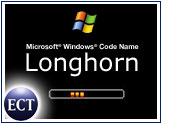
Software pirates in Malaysia are reportedly selling an illegal version of Microsoft’s next-generation Windows desktop operating system, codenamed Longhorn, which is not scheduled for official release for another two years at least.
In October, Microsoft gave out previews of Longhorn at its developers’ conference in Los Angeles, and the company has since touted its storage, security and Internet features. A Microsoft attorney indicated the software on sale in CD form in Malaysia — priced under US$2 — is in fact the demonstration version from the conference, which is not intended for consumer use.
Yankee Group senior analyst Laura DiDio said that Microsoft, as well as any other software vendor, painfully knows the price of piracy, which has prompted the company to throw millions toward global enforcement of copyrights. “They’re all losing billions a year in lost revenue from this stuff,” said DiDio, adding that the issue can make friends of rivals in the software industry. “There is not a software vendor out there who hasn’t been a victim of this.”
Short Time for Longhorn
The exposure of Longhorn to the public as a result of piracy is nothing new for the Redmond, Washington software company. Before the release of Windows 2000, for example, counterfeit copies of the prerelease software resulted in the availability of viruses for the operating system before it was even officially released to the public.
Longhorn has been described as among the company’s largest and most significant endeavors. At Comdex last month, Microsoft chief Bill Gates called the Longhorn PC the center of seamless computing — a next “frontier” in computing highlighted by rich flexibility with support for advanced networking, Web services, managed application programming interfaces and an improved file system.
Meanwhile, the schedule for Longhorn has been pushed back and the new desktop operating system now might not be released for purchase — likely to be priced in the $100 to $300 range for different versions — until 2006.
Fakes a Fact of Life
One might assume the fact that the pirated version of the software — however rough or unready — is disappointing for Microsoft. But Yankee’s DiDio said that however unfortunate the bootlegged Longhorn is, it is unlikely to be surprise to Microsoft.
“I think they realize this is the cost of doing business,” she said.
DiDio, who said Microsoft is better able to guard its code and track pirated versions today than it was three years ago, said that in addition to costing the developer money, pirated software also fails to work properly and can be “a breeding ground for viruses and everything else.”
Software piracy — rampant in several regions, including Eastern Europe, Indonesia, Malaysia and China — was blamed for $13 billion in lost revenue worldwide, $2 billion lost revenue in the United States and more than 100,000 lost jobs in 2002, according to the Business Software Alliance.
DiDio said that Microsoft, which likely will work with authorities, business allies and others to find the source of the pirated Longhorn, has better controls in place now to do so. “They’re throwing a lot more resources at the problem of security and bootlegging,” she said.
Microsoft Response
In response to request for comment, Microsoft told TechNewsWorld in an e-mail statement that counterfeiting and piracy are important priorities for the company and that the company is working “to prevent any actions that would undermine uses of or confidence in technology and the Internet.”
The code that was distributed at the developers’ conference, said the company, is intended as an “early preview” of the next version of the Windows desktop operating system and “not for widespread use among customers.” The code does not have the latest security patches, is not supported and is not designed for production use, said the company.
Microsoft added that users of “genuine software” have access to technical support, updates and security enhancements as well as “the peace of mind that comes from knowing that they do not have to be concerned about audits or other legal troubles associated with unlicensed software.”
De Facto Defender
DiDio said that the quick availability of Longhorn indicates that bootleggers are getting more sophisticated and rapid in their counterfeiting and distribution.
The analyst also said that although Microsoft is not alone in falling victim to software piracy, the company’s leading market position dictates that it also must lead the fight against software piracy. DiDio said she would not be surprised to see Microsoft issue reward money for information on piracy similar to its recently announced $5 million bounty fund for virus writers.
“If you’ve got $50 billion in the bank, what better way to spend it?” DiDio said.











































